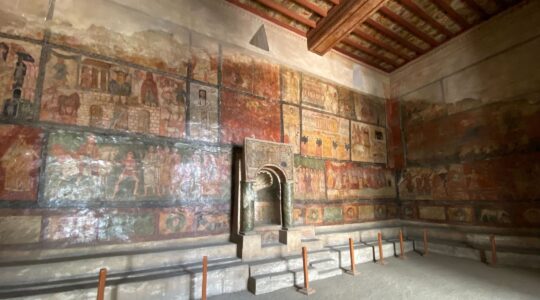President-elect Barack Obama is expressing his condolences on the death of Chicago Rabbi Arnold Jacob Wolf, who died Tuesday at the age of 83. Here’s his statement:
I am deeply saddened to learn of the passing of Rabbi Arnold Jacob Wolf, who was not just our neighbor, but a dear friend to Michelle and me. We are joined in this time of grief by the entire Hyde Park community, the American Jewish Community, and all those who shared Rabbi Wolf’s passion for learning and profound commitment to serving others. Our thoughts and prayers are with his family.
Throughout Chicago and in Jewish homes and classrooms across our country, Rabbi Wolf’s name is synonymous with service, social action and the possibility of change. He will be remembered as a loving husband and father, an engaging teacher, a kindhearted shepherd for the K.A.M. Isaiah community, and a tireless advocate of peace for the United States, Israel and the world.
Here’s a mass letter that Wolf sent out earlier this year hailing Obama (note the last sentence):
My Neighbor, Barack
By Arnold Jacob WolfNot everyone can claim to be the neighbor of a Presidential candidate – I can, though, because I am.
Barack Obama’s Chicago home is across the street from KAM Isaiah Israel, the Hyde Park synagogue at which I’ve served for 27 years. He spoke to our congregation as an Illinois state senator; more recently, his Secret Service agents have made use of our, shall we say, facilities.
But it’s not neighborly instinct that’s led me to support the Obama candidacy: I support Barack Obama because he stands for what I believe, what our tradition demands.
We sometimes forget, but an integral part of that tradition is dialogue and a willingness to disagree. Certainly many who call me their rabbi have taken political positions far from mine – just as Barack Obama’s opinions have differed from those of his former pastor, the Rev. Jeremiah Wright.
The candidate recently gave a speech which made abundantly clear that he and Wright often disagree. Obama condemned Wright’s “incendiary language,” and “views that have the potential not only to widen the racial divide, but… that denigrate both the greatness and the goodness of our nation.”
Of course, race is only one issue on which Wright has stepped beyond the bounds of civil discourse. He’s frequently made statements regarding Israel and the Jewish community that I find troubling. But to limit our understanding of Obama to the ill-conceived comments of the man who once led his church is dishonest and self-defeating.
Obama’s strong positions on poverty and the climate, his early and consistent opposition to the Iraq War, his commitment to ending the Darfur genocide – all these speak directly to Jewish concerns. If we’re sidetracked by Wright’s words, we’ll be working against these interests. After all, a preacher speaks to a congregation, not for the congregation.
And still many remain concerned that Obama isn’t committed to Israel. Some want him to fall in line behind the intransigent, conservative thinking that has silenced Jewish debate on Israeli policy, and enabled the Bush Administration’s criminal neglect of the diplomatic process.
Clearly, though, anyone who thinks Obama waffles on Israel hasn’t been paying attention. In 2007, he spoke to AIPAC about “a clear and strong commitment to the security of Israel”; today, his website states clearly that America’s “first and incontrovertible commitment in the Middle East must be to the security of Israel.”
For my part, I’ve sometimes found Obama too cautious on Israel. He, like all our politicians, knows he mustn’t stray too far from the conventional line, and that can be disappointing. But unlike anyone else on the stump, Obama has also made it clear that he’ll broaden the dialogue. He knows what peace entails.
Speaking recently before a Jewish audience in Cleveland, Obama did the unthinkable – he challenged the room. He talked about the need to ask “difficult questions” on the Israeli-Palestinian conflict: “I sat down with the head of Israeli security forces,” he said “and his view of the Palestinians was incredibly nuanced…. There’s good and there’s bad, and he was willing to say sometimes we make mistakes… and if we’re just pressing down on these folks constantly, without giving them some prospects for hope, that’s not good for our security.”
Yet, in spite of all of Obama’s strengths, there’s another truth we’ve been loathe to admit: Among some American Jews, race plays a key role in the hesitation to support the Obama candidacy. We’ve forgotten that Black and Jewish America once shared a common vision; in the civil rights era, I and many in our community stood shoulder to shoulder with the giants of our generation, demanding freedom for all Americans.
Obama himself doesn’t share our amnesia, however. “I would not be sitting here,” he said in Cleveland, “if it were not for a whole host of Jewish Americans.” That was literal truth, but not everyone remembers it.
I’ve worked with Obama for more than a decade, as has my son, a lawyer who represents children and people with disabilities. He has admired Obama’s dedication and skill as he worked on issues affecting our most vulnerable citizens.
Obama is no anti-Semite. He is not anti-Israel. He is one of our own, the one figure on the political scene who remembers our past, and has a real vision for repairing our present.
Barack Obama is brilliant and open-hearted; he is wiser and more thoughtful than his former minister. He offers what America, Israel, and the Jewish community need: a US President willing to ask hard questions, and grapple with difficult answers.
I am very proud to be his neighbor. I hope someday to visit him in the White House.
JTA has documented Jewish history in real-time for over a century. Keep our journalism strong by joining us in supporting independent, award-winning reporting.





